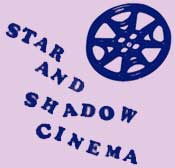The Gleaners and I
Dir. Agnes Varda, French with English subtitles, 2000
-
Thu 26 November 2009 // 19:30
/ Cinema
11 international awards, incredible critical reception, and most of all - one of our favourite films ever. An absolute gem.
GLEANERS?
This film is about Agnes Varda going around France, trying to meet people who "glean".
"Glean" is a translation from the French term "glaner", which is quite common in French: it was used in the past, to talk about gathering remnants of crops from a field after the harvest.
In this film, Agnes Varda extends the meaning and meets people who go through (rich poeple's) bins, through vegetables left over after farmers markets, or through potatoes left over in fields because they are not the right shape.
POLITICAL STATEMENT?
Despite its subject matter, this film is much more than a political or environmental documentary - it would be very wrong to categorise this film in such a way.
Here is what THE GUARDIAN says:
"In younger, ruder hands, The Gleaners and I would surely have wound up a far more abrasive affair, touching as it does on the charged issue of direct action among a disenfranchised underclass.
Except that Varda shies decorously away from obvious political conclusions. Instead, her line of inquiry is gentle, curious, her role more that of a browser than a director. The tack pays off in a film that is at once airily free-form and oddly profound."
DIGRESSIONAL DOCUMENTARY?
This is a film that is very hard to define, and if you're not into documentaries, please don't be put off by that denomination - because it is also so much more.
The film got some awards as best documentaries over the world, but it is also a film about Agnes Varda - simply because she allows herself a lot of digressions, the expression of personal thoughts, and generally a lot of freedom.
Even the NEW YORK TIMES says it, here:
Agnes Varda "is a constant, funny presence in the film, providing piquant voice-over narration and allowing herself visual and verbal digressions on the state of her aging hands, the water damage on her ceiling and her portable camera's dancing lens cap."
HEART SHAPED POTATOES
 This film shows a lot of potatoes that have a heart shape, and here is the explanation, from the FINANCIAL TIMES:
This film shows a lot of potatoes that have a heart shape, and here is the explanation, from the FINANCIAL TIMES:
" "I was making a statement about how everything is so formated nowadays, potatoes have to be just so, apples too,” says Varda, her hair cut in a resplendent two-tone bob.
“I thought this was an interesting metaphor for our society which likes people to be formated, something I’ve never wanted to be as a filmmaker. I know I’m working on the margins and that’s what I like to fight for: alternative cinema.” "
TREASURE
This film is a little gem - it is unique, beautiful, amazing, touching, true, free, and radically different without being radical.
Here is what THE NEW YORK TIMES also says:
"The film is studded with found metaphors and serendipitous insights, like the collection of heart-shaped potatoes Ms. Varda brings home from her travels. They're coarse, homely objects, misshapen and flecked with dirt, unmarketable in the view of the potato growers.
But their poetic value is self-evident. ''I'm something of a leftover myself,'' Ms. Varda remarked to journalists covering the New York Film Festival. This was a charming bit of modesty. She's a treasure."
Thank you the New York Times, we rather agree on that one! Varda is amazing and this film is incredible stuff.
AWARDS
The film won 11 awards accross the world, here are some of them:
BEST DOCUMENTARY - European Film Awards
BEST DOCUMENTARY - Boston Society of Film Critics Award
BEST DOCUMENTARY - Chicago Film Critics Association Award
BEST FILM - French Syndicate of Cinema Critics
BEST NON-FICTION FILM - Los Angeles Film Critics Association Awards
BEST NON-FICITON FILM - New York Film Critics Circle Awards
PART OF THE AGNES VARDA FILM SEASON (12 Nov - 26 Nov)
 Agnes Varda, French film director born in 1928, is one of the most celebrated female directors in the history of cinema.
Agnes Varda, French film director born in 1928, is one of the most celebrated female directors in the history of cinema.
Discreet, humble, intelligent, confident and origianl all at once, she is impossible to classify or categorise. "Varda is very much her own creation" (Sight and Sound).
This season would not have been possible without the support of the Institut Francais and CulturesFrance, and we are very thankful for their help.
